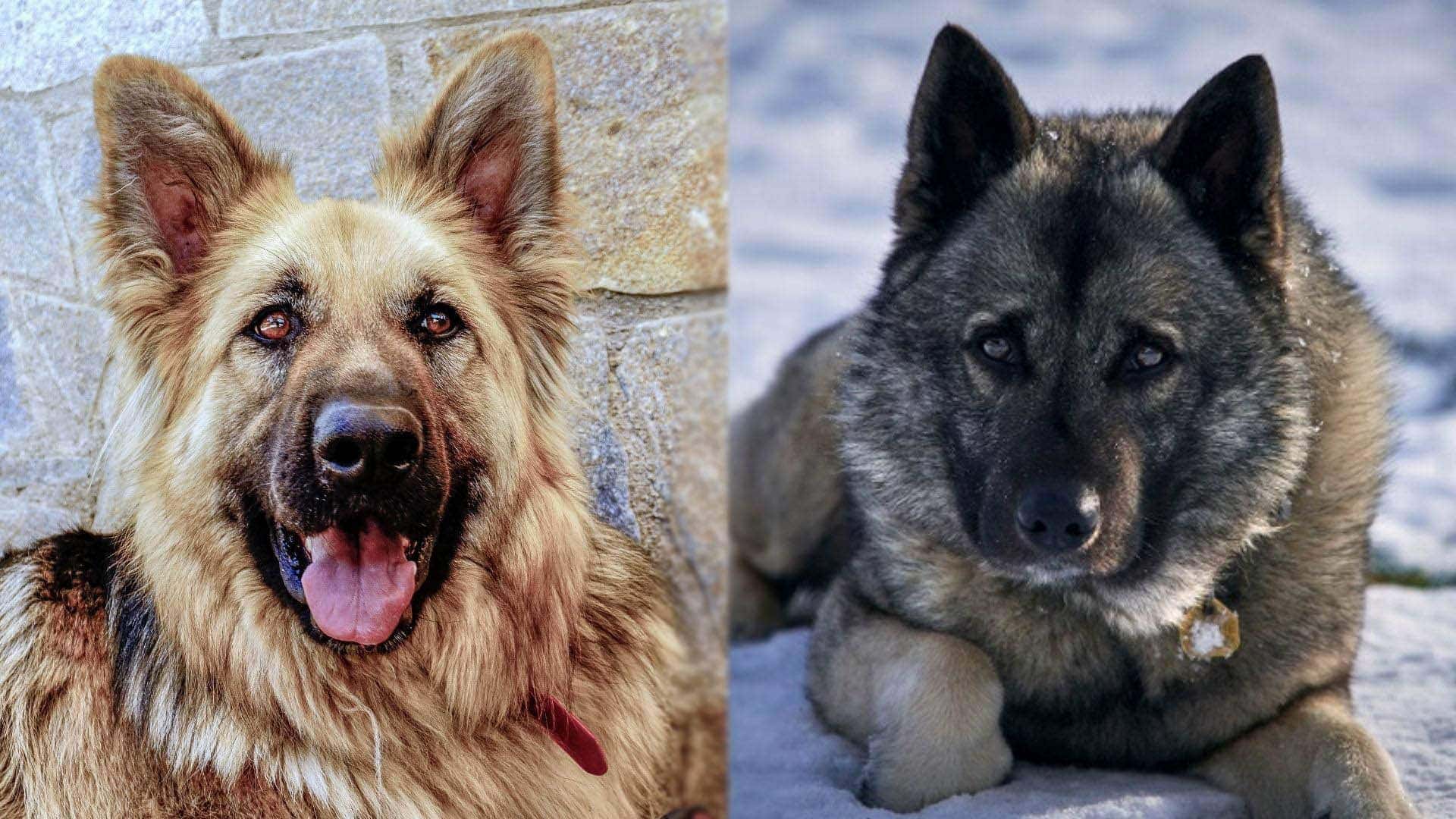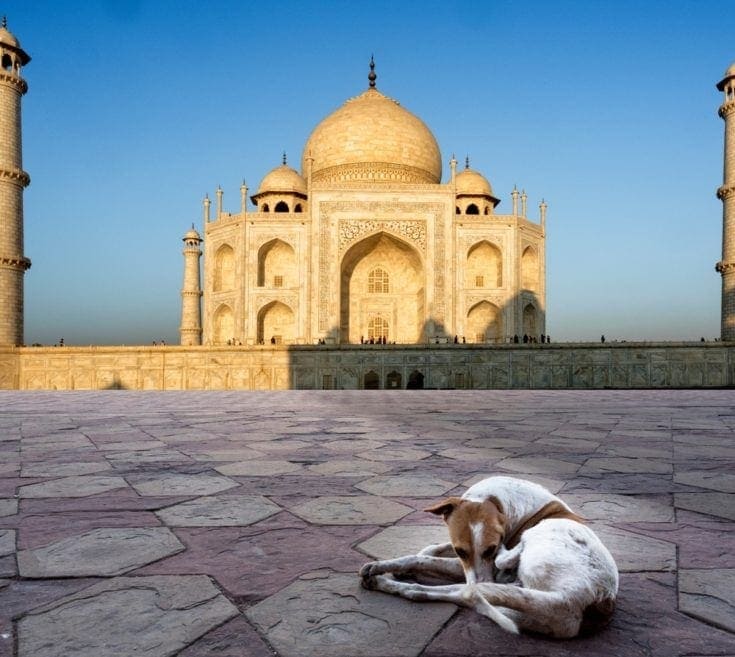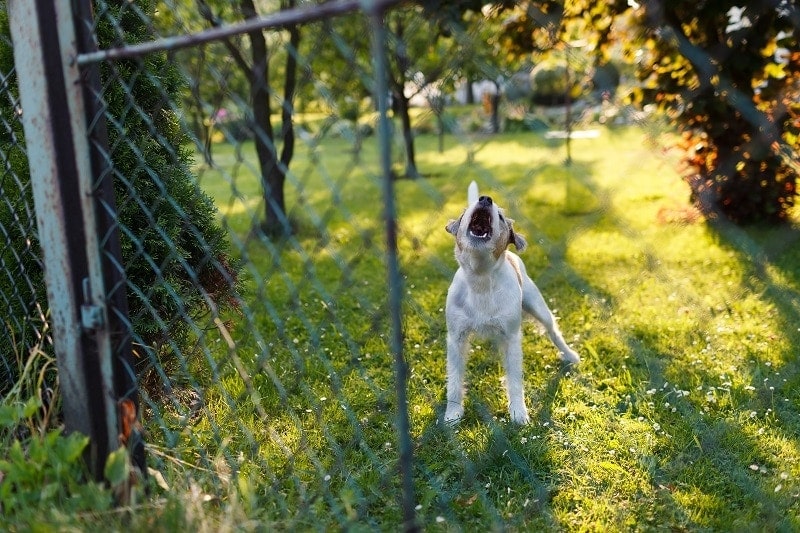How to Potty Train a Husky (8 Quick & Easy Steps)

Updated on
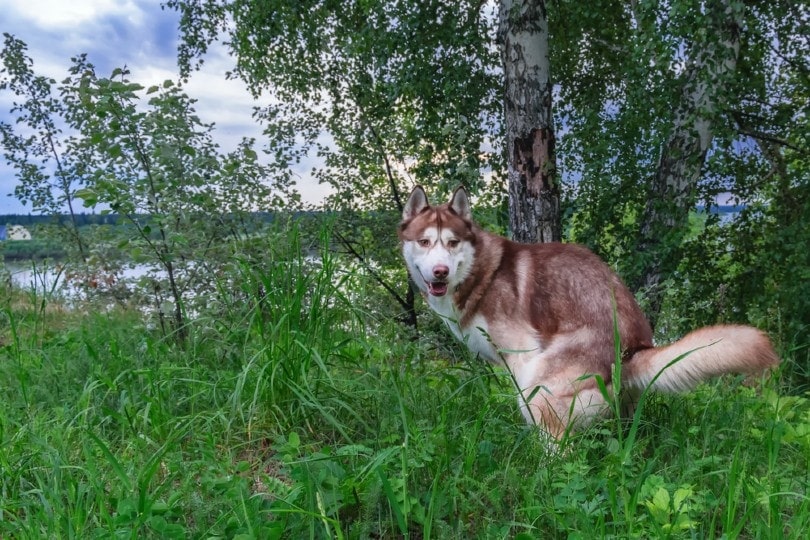
When you get a puppy, you’re going to be over the moon for the first few days. But after that, some realities are going to set in, and you’ll want to prepare for them. Potty training might be one of the most challenging stages of your Husky’s adolescence, but it doesn’t have to be overwhelming.
By simply applying a few basic principles, you can make the process fast-paced and smooth. Huskies have spirited personalities, but no two will be the same. It’s hard to predict how receptive your puppy will be to training, but you can adapt to their learning style as you go.
What Age to Start Training a Husky Puppy?
Husky puppies are energetic, active animals that need plenty of exercise, structure, and discipline. These pups are full of wanderlust and adventure, so having an enclosed space for your Husky is vital for everything from backyard play to potty time.
You can start to potty train your Husky as soon as you bring them home at 8 weeks. You might also get lucky, as some breeders begin the process before they go to their new homes. Since Huskies are brilliant pups, you can expect them to catch on quickly.
That doesn’t mean things will be seamless, though. Huskies are highly spirited dogs with lots of scattered energy. Getting them to settle in to learn might be a task in itself, but it’s definitely manageable with the right techniques.
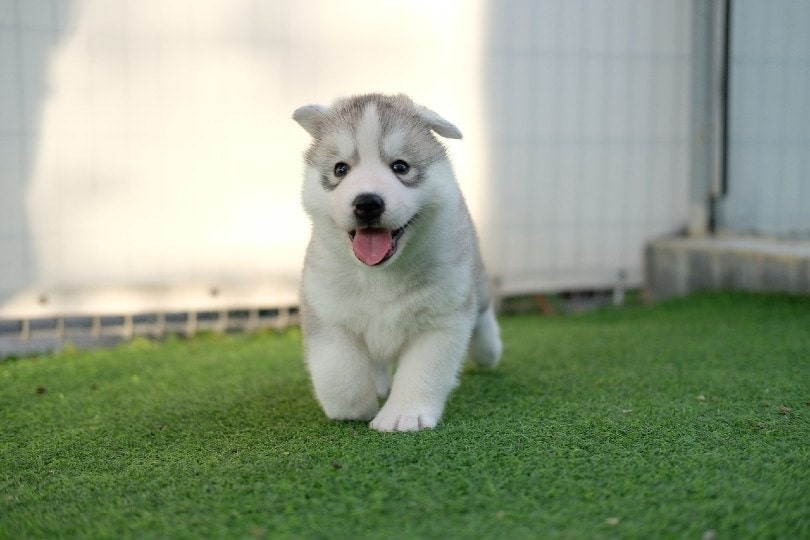
Are Siberian Huskies Hard to Train?
There might be some rumors out there that proclaim huskies are hard to train, but is it true? Comparatively speaking, yes, they are. But why? Well, Huskies are incredibly intelligent canines, but they also have a mind of their own.
Because they have a strong will, they can be tough to handle. You have to have a firm training method to get through to them. Eventually, they will buckle down and get with the program, but it’s essential to know what you’re up against before you start.
Remember that Huskies are pack-minded. That means there has to be a hierarchy in your relationship. You need to establish firm dominance, so they know you need to be taken seriously. Once they learn to calm down for teaching time and respect you as the master—it will be a cinch.
Training Dogs at Any Age
A full-grown adult dog might not be housetrained—it happens. You might not be looking for training tips for early years. You might have gotten a dog from a shelter or from a previous outdoor environment. Luckily, house training an older dog is similar to training a puppy, but it might take more or less time depending on the dog.
Poorly Trained Older Husky Puppy
If your Husky is already advancing through adolescence, they might have already developed poor bathroom habits. If the previous owner did not work with them appropriately, they might have frequent accidents, even if they mildly pick up on the concept of house training.
If your pup has poor bathroom etiquette, it might be a little challenging to retrain these bad habits, but they can still accomplish it.
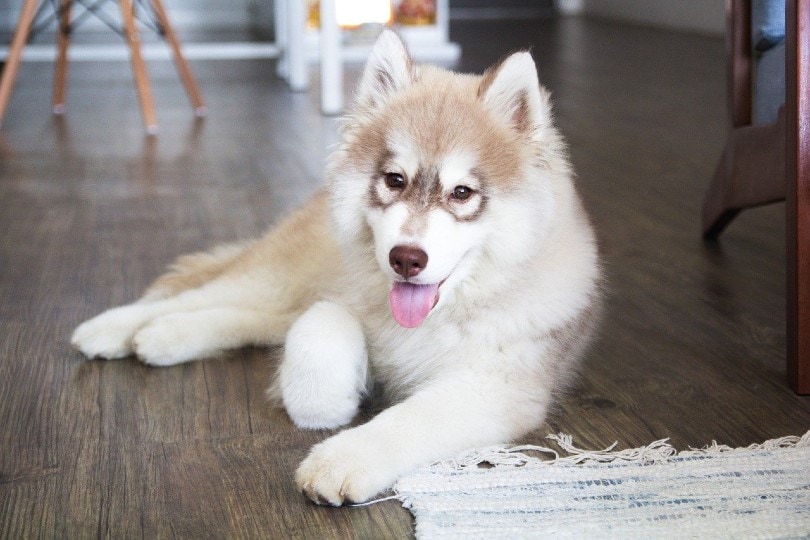
Adopted or Rehomed Husky
Many times, until your Husky fully adjusts or adapts to their new environment, they might have accidents. Even an otherwise fully-trained Husky might have a little trouble figuring things out at first.
Be patient with your new Husky. Once they get used to the routine around the house, they will be back to their old ways in no time.
Exclusively Outdoor Husky
A full-grown Husky that has only ever been an outside dog might be the most challenging type to retrain. On the opposite side of the coin, they might be the easiest—it depends on the dog.
Since they were once able to eliminate freely, they might think this behavior will be the same indoors. Others might not like the feeling of the carpet or hardwood and actually prefer to go outside.

The 8 Steps on How to Potty Train a Husky
1. Choose a designated spot for your puppy to go potty.
Before you even bring your puppy home, you want to get an idea of where potty time will take place. Regardless of where you live, it would help if you thought of a spot that will be out of the way and memorable for your pup.
2. Take your puppy to that spot as soon as you bring them home.
Before you even enter the house, let your Husky pup sniff around the area to check things out. They might need a spot to go after that long car ride!
3. Always take your puppy out immediately after naps and mealtime.
Once your pup wakes up, they will need to tinkle. After supper is the same—they need to go out right away. Soon, your puppy will associate waking up or finishing dinner with using the potty.
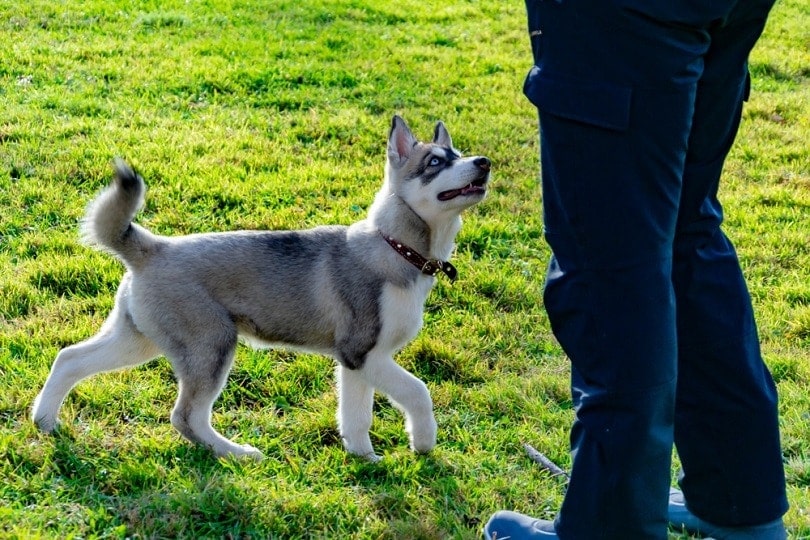
4. Follow a schedule.
Having a solid routine is essential. Take your pup out in increments that you time evenly.
5. Feed them at the same time every day.
Whether you break up your pup’s meal in two or three increments throughout the day, make sure it’s the same time. When you take them out afterwards, they will soon notice the relationship between eating and going to the bathroom.
6. Don’t wait.
If you see your pup nosing around, take them out immediately. Sometimes, you have to watch for visual cues and not rely on your routine or your pup to tell you otherwise.

7. Crate train your puppy.
In the very beginning and throughout training, crating your puppy is an excellent idea. They shouldn’t always be in their cage, of course. But when they are unsupervised, it is night, or when you aren’t home—they need to be contained.
8. Don’t leave your Husky pup unsupervised.
Remember that your puppy is still a puppy, even when they start getting big. Please don’t leave them unsupervised for extended intervals. They are more likely to use the bathroom when you aren’t there to see the visual clues that they need to go out.

How to Train a Husky
- Patience. It is going to be hard it might be the most challenging part of raising your Husky. You have to stay level-headed and understanding through the whole process. After all, they are just babies.
- Consistency. Your puppy will learn through repetition. The more something happens, the more it sticks. Right now, a bulk of the responsibility falls on you, so make sure you’re steady with the process.
- Routine. Your Husky will benefit very much from a routine, even outside of potty time. The more you can keep things in a specific order throughout the day, the better your puppy will catch on to what is expected of them.
- Positive Reinforcement. Your puppy is getting the hang of something new. It’s going to take time. Harsh punishments are only going to set you back. Keep it positive and offer lots of incentives for good behavior, like yummy treats!
Crate Training Chart
When you’re crate training, here is how long your pup should stay in their space at a time.
| 8 to 10 weeks | Up to 60 minutes |
| 11 to 14 weeks | Up to 3 hours |
| 15 to 16 weeks | Up to 4 hours |
| 17+ weeks | Up to 5 hours |
- Note: These are maximum approximations per age. You might need to tailor the chart to match your specific Husky pup’s needs, as they can mature at different paces.
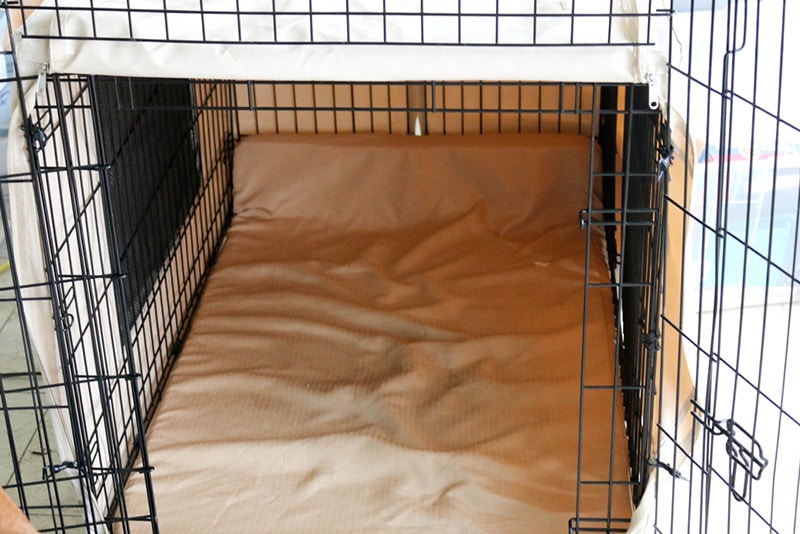
Did You Know?
- The size of your pup can determine how easy it will be to house train. A larger breed, like a Husky, might be easier to train than a smaller dog. You can read more about the study here.
- Dogs learn through a process referred to as conditioning. Basically, your dog learns through repetition of action to consequence.
- Rubbing their nose in the mess doesn’t work—don’t do it. The tale as old as time with rubbing dogs’ noses in their poop might not be the best method. Often, this simply confuses and scares your dog—which can lead to more significant issues than just poor potty habits.
- Crate training won’t work for some puppies. If a dog has been in crates or crate-like areas as pups, they might just go in their crate no matter what. Once they learn the behavior is okay, they’re more likely to repeat it. Unfortunately, some dogs like those from shelters or pet shops are less apt to be receptive to this training type.
- Negative training might lead to submissive urination in dogs. If you punish a dog too harshly, it could lead to bigger issues like piddling. When this happens, your dog knows you’re upset and tries to show you that they submit entirely. This often makes the situation worse, so try to use positive reinforcement tactics as much as possible.
Final Thoughts
Potty training your Husky might be a lengthy process but know that it will all be over soon. In time, you’ll have a totally capable pup that’s ready to let you know each time they need to go out. But remember, they are just babies. As with learning anything, repetition helps your Husky retain new information.
Featured Image Credit to: Konstantin Zaykov, Shutterstock





